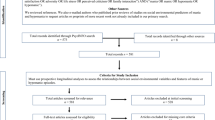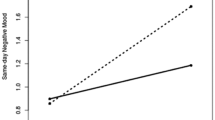Abstract
The impact of psychosocial adversity on the onset and course of bipolar disorder has been assessed in studies that have relied on methods of eliciting life event histories and evaluating family atmosphere. The results of life event studies have been inconsistent, perhaps because the relationship between bipolar disorder and major stress is only pronounced in first or early episodes. If this is so, this phenomenon itself invites explanation, whether in social or biological terms. The two studies to data of family atmosphere suggest an association between high expressed emotion and relapse. The relationship between psychosocial stress and bipolar disorder requires further and more detailed research.
Similar content being viewed by others
References
Ambelas A (1979) Psychologically stressful events in the precipitation of manic episodes. Br J Psychiatry 135: 15–21
Ambelas A (1987) Life events and mania: a special relationship? Br J Psychiatry 150: 235–240
Ambelas A, George M (1986) Predictability of course of illness in manic patients positive for life events. J Nerv Ment Dis 174: 693–695
Ambelas A, George M (1988) Individualized stress vulnerabilities in manic depressive patients with repeated episodes. J R Soc Med 81: 448–449
Aronson TA, Shukla S (1987) Life events and relapse in bipolar disorder: the impact of a catastrophic event. Acta Psychiatr Scand 75: 571–576
Bebbington PE (1982) The course and prognosis of affective psychosis. In: Wing JK (ed) Cambridge handbook of psychiatry, vol III. Cambridge University Press, Cambridge, pp 120–128
Bebbington PE, Kuipers L (1994) The predictive utility of Expressed Emotion in schizophrenia: an aggregate analysis. Psychol Med 24: 707–718
Bebbington PE, Ramana R (1995) The epidemiology of bipolar affective disorder: a review. Soc Psychiatry Psychiatr Epidemiol (in press)
Bebbington PE, Brugha T, MacCarthy B, Potter J, Sturt E, Wykes T, Katz R, McGuffin P (1988) The Camberwell Collaborative Depression Study. I. Depressed probands: adversity and the form of depression. Br J Psychiatry 152: 754–765
Bebbington PE, Wilkins S, Jones P, Foerster A, Murray R, Toone B Lewis S (1993) Life evants and psychosis: initial results from the Camberwell Collaborative Psychosis study. Br J Psychiatry 162: 72–79
Bebbington PE, Wilkins S, Sham P, Jones P, van Os J, Murray R, Toone B, Lewis S (1995) Life events and psychosis: the influence of clinical and social variables. Submitted to Acta Psychiatrica Scandinavica
Beck AT (1983) Cognitive therapy of depression: new perspective. In: Clayton PJ, Barrett JE (eds) Treatment of depression: old controversies and new approaches. Raven Press, New York, pp 265–290
Bohlken J, Priebe S (1991) Political change and course of affetive psychoses: Berlin 1989–90. Psychiatry Res 37: 1–4
Bonnafais-Serieux H, Ey H (1938) Manies de veuvage. Med Psychologiques. Part 1. 96: 225–232
Brown GW, Birley JLT (1968) Crises and life changes and the onset of schizophrenia. J Health Soc Behav 9: 203–214
Brown GW, Harris TO (1978) Social origins of depression: a study of psychiatric disorder in women. Tavistock, London
Chang RK, Langeluddecke P, Tennant C (1986) Threatening life events in the onset of schizophrenia, schizophreniform psychosis and hypomania. Br J Psychiatry 148: 680–686
Claney J, Crowe R, Winokur G, Morrison J, (1973) The Iowa 500: precipitating factors in schizophrenia and primary affective disorder. Compr Psychiatry 14: 197–202
Dohrenwend BS, Dohrenwend BP (1974) Overview and prospects for research on stressful life events. In: Dohrenwend BS, Dohrenwend BP (eds) Stressful life events: their nature and effects. Wiley and Sons, New York, pp 313–331
Dunner DL, Patrick V, Fieve RR (1979) Life events at the onset of bipolar affective illness. Am J Psychiatry 136: 508–511
Ellicott A, Hammen C, Gitlin M, Brown G, Jamison K (1990) Life events and the course of bipolar disorder. Am J Psychiatry 147: 1194–1198
Glassner B, Haldipur CV (1983) Life events and early and late onset of bipolar disorder. Am J Psychiatry 140: 215–217
Haas GL, Glick ID, Spencer JH, Clarkin JF, Lewis AB, Good-Ellis M, Payser J, DeMane N, Harris E, Lestelle V (1986) The patient, the family and compliance with post hospital treatment for affective disorders. Psychopharmacol Bull 22: 999–1005
Hall KS, Dunner DL, Zeller G, Fiere RR (1977) Bipolar illness: a prospective study of life events. Compr Psychiatry 18: 497–502
Hammen C, Ellicott A, Gitlin M, Jamison KR (1989) Sociotropy/autonomy and vulnerability to specific life events in patients with unipolar depression and bipolar disorders. J Abnorm Psychol 98: 154–160
Hooley JM, Orley J, Teasdale J (1986) Levels of Expressed Emotion and relapse in depressed patients. Br J Psychiatry 148: 642–647
Hudgens RW, Morrison RR, Barchha RG (1967) Life events and the onset of primary affective disorders: a study of 40 hospitalized patients and 40 controls. Arch Gen Psychiatry 16: 134–145
Hunt N, Bruce-Jones W, Silverstone T (1992) Life events and relapse in bipolar affective disorder. J Affective Disord 25: 13–20
Joffe R, MacDonald C, Kutcher SP (1989) Life events and mania; a case controlled study. Psychiatr Res 30: 213–216
Kennedy S, Thompson R, Stancer HC, Roy A, Persad E (1983) Life events precipitating mania. Br J Psychiatry 142: 398–403
Kraepelin E (1921) Manic depressive insanity and paranoia. Trans R. M. Barclay; Robertson GM (ed) Livingstone, Edinburgh
Kuipers L, Bebbington PE (1988) Expressed Emotion research in schizophrenia: theoretical and clinical implications. Psychol Med 18: 893–910
Kuipers L, Bebbington PE (1990) Working in partnership: clinicians and carers in the management of longstanding mental illness. Heinemann Medical, Oxford
Leff JP, Vaughn C (1976) Schizophrenia and family life. Psychol Today 10: 13–18
Leff MH, Roach JF, Bunney WE (1970) Environmental factors preceding the onsets of severe depressions. Psychiatry 33: 293–311
Leff JP, Fischer M, Bertelsen A (1976) A cross-national epidemiological study of mania. Br J Psychiatry 129: 428–437
Leff JP, Kuipers L, Berkowitz R, Vaughn CE, Sturgeon D (1983) Life events, relatives' Expressed Emotion and maintenance neuroleptics in schizophrenic relapse. Psychol Med 13: 799–806
McPherson H, Herbison P, Romans S (1993) Life events and relapse in established bipolar affective disorder. Br J Psychiatry 163: 381–385
Merikangas KR, Bromet EJ, Soker DG (1983) Assortive mating, social adjustment and course of illness in primary affective disorder. Arch Gen Psychiatry 40: 795–800
Miklowitz DJ, Goldstein MJ, Nuechterlein KH, Snyder KS, Mintz J (1988) Family factors and the course of bipolar affective disorder. Arch Gen Psychiatry 45: 225–231
O'Connell RA, Mayo JA, Flatow L, Cuthbertson B, O'Brien BE (1991) Outcome of bipolar disorder on long-term treatment with lithium. Br J Psychiatry 159: 123–129
Okuma T, Shimoyama N (1972) Course of endogenous manic depressive psychosis, precipitating factors and premorbid personality—a statistical study. Folia Psychiatr Neurol (Japan) 26: 19–33
Perris H (1984) Life events and depression. Part 2. Results in diagnostic subgroups, and in relation to the recurrence of depression. J Affective Disord 7: 25–36
Post RM (1990) Sensitization and kindling perspectives for the course of affective illness: toward a new treatment with the anticonvulsant carbamazepine. Pharmacopsychiatry 23: 3–17
Post RM (1992) Transduction of psychosocial stress into the neurobiology of recurrent affective disorder. Am J Psychiatry 149: 999–1010
Post RM, Rubinow DR, Ballenger JC (1986) Conditioning and sensitization in the longitudinal course of affective disorder. Br J Psychiatry 149: 191–201
Priebe S, Wildgrube C, Muller-Oerlinghausen B (1989) Lithium prophylaxis and Expressed Emotion. Br J Psychiatry 154: 396–399
Rice J, Reich T, Andreasen NC, Endicott J, Van-Eerdewegh M, Fishman R, Hirschfeld RM, Klerman GL (1987) The familial transmission of bipolar illness. Arch Gen Psychiatry 44: 441–447
Sclare P, Creed F (1990) Life events and the onset of mania. Br J Psychiatry 156: 508–514
Stern ES (1944) The psychopathology of manic-depressive disorder and involutional melancholia. Br J Med Psychol 20: 20–32
Swann AC, Sekunda SK, Stokes PE, Croughan J, Davis JM, Koslow SH, Maas JW (1990) Stress, depression and mania: relationship between perceived role of stressful events and clinical and biochemical characteristics. Acta Psychiatr Scand 81: 389–397
Wicki W, Angst J (1991) The Zurich Study. X. Hypomania in a 28-to 30-year-old cohort. Eur Arch Psychiatry Neurol Sci 240: 339–348
Winokur G, Coryell W, Akiskel HS, Endicott J, Keller M, Mueller T (1994) Manic depressive (bipolar) disorder: the course in the light of a prospective ten-year follow-up of 131 patients. Acta Psychiatr Scand 89: 102–110
Author information
Authors and Affiliations
Rights and permissions
About this article
Cite this article
Ramana, R., Bebbington, P. Social influences on bipolar affective disorders. Soc Psychiatry Psychiatr Epidemiol 30, 152–160 (1995). https://doi.org/10.1007/BF00790652
Accepted:
Issue Date:
DOI: https://doi.org/10.1007/BF00790652




